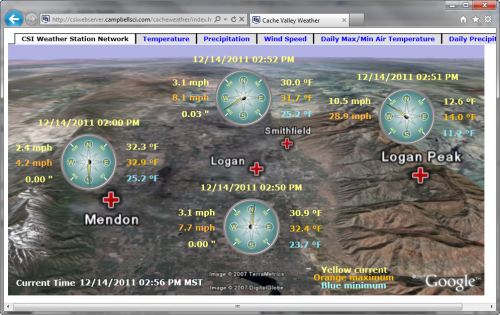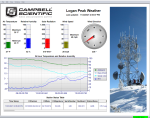
Overview
Current Version: 1.7
The CSI Web Server software package includes the CSI Web Server, CSI Web Server Administrator, and the Web Publisher. The CSI Web Server runs on a PC and displays projects created using RTMC or RTMC Pro in any web browser that supports HTML5. The Web Server Administrator allows you to configure or check the status of the Web Server, and easily browse to one or more websites running on the Web Server. The Web Publisher is used to publish your RTMC or RTMC Pro project to either a PC website running the CSI Web Server or to an HTTP-enabled data logger such as a CR6 or CR1000 with an NL120 attached. (Publishing to a data logger requires an RTMC Pro project.) In addition, the Web Publisher has display settings that allow you to show other tabs for data browsing and network status.
The CSI Web Server package is included with RTMC Pro. It can also be purchased separately for use with the standard RTMC Development application that is bundled with LoggerNet, LoggerNet Admin, and RTDAQ.
Read MoreImages

Similar Products
Detailed Description
The CSI Web Server allows you to view your RTMC projects using a web browser. You can also change input locations and public variable values, toggle ports/flags, and browse through historical report data from a web browser.
Security for the CSI Web Server is provided through password file(s) that control the rights of different users to view data, change data values, and publish websites.
The CSI Web Server supports HTTPS encrypted communication. To use HTTPS, a Private Key file and Certificate File must be obtained from a third-party Certificate Authority.
Compatibility
Note: The following shows notable compatibility information. It is not a comprehensive list of all compatible or incompatible products.
Data Loggers
| Product | Compatible | Note |
|---|---|---|
| 21X (retired) | ||
| CR10 (retired) | ||
| CR1000 (retired) | ||
| CR1000X (retired) | ||
| CR10X (retired) | ||
| CR200X (retired) | ||
| CR206X (retired) | ||
| CR211X (retired) | ||
| CR216X (retired) | ||
| CR23X (retired) | ||
| CR295X (retired) | ||
| CR300 (retired) | ||
| CR3000 (retired) | ||
| CR310 | ||
| CR350 | ||
| CR500 (retired) | ||
| CR5000 (retired) | ||
| CR510 (retired) | ||
| CR6 | ||
| CR800 (retired) | ||
| CR850 (retired) | ||
| CR9000 (retired) | ||
| CR9000X (retired) |
Additional Compatibility Information
Software
CSI Web Server is optimized for using projects created with the RTMC 4.x development tools (standard RTMC Development or RTMC Pro). Although CSI Web Server can use projects from version 2.x or 3.x development tools, the web display may look different than what’s expected. For best performance, RTMC version 4.x development tools should be used to develop projects for CSI Web Server.
Computer
CSI Web Server runs on Windows 10 and 11. CSI Web Server runs on both 32-bit and 64-bit versions of these operating systems.
Web Browser
CSI Web Server requires HTML 5. The following target browsers are supported at the indicated version or later:
- Chrome 10
- Firefox 4
- Internet Explorer 9
- Microsoft Edge 117
- Opera 11
- Safari 5
Specifications
| Current Version | 1.7 |
| Operating System | Windows 11 or 10 (Both 32- and 64-bit operating systems are supported.) |
Documents
Downloads
CSI Web Server Patch v.1.7 (37.8 MB) 05-22-2024
Campbell Scientific has an option to buy the CSI Web Server as a stand-alone product.
This patch will upgrade the stand-alone installation of the CSI Web Server version 1.0 and newer to 1.7. A qualifying version of the CSI Web Server must be installed on the computer.
Note: This will not upgrade the CSI Web Server installed with RTMC Pro.
Frequently Asked Questions
Number of FAQs related to CSIWEBS: 1
-
A network camera can be connected directly to a CR1000 or CR3000 via an NL115 or NL120 and a crossover cable. The data logger can retrieve and store images from the network camera. Then the images can be viewed or retrieved from the data logger in a variety of ways. These include using LoggerNet, the data logger’s web server, the data logger’s FTP client/server, or the data logger’s email client.
Articles and Press Releases
Newsletter Articles
Privacy Policy Update
We've updated our privacy policy. Learn More
Cookie Consent
Update your cookie preferences. Update Cookie Preferences




